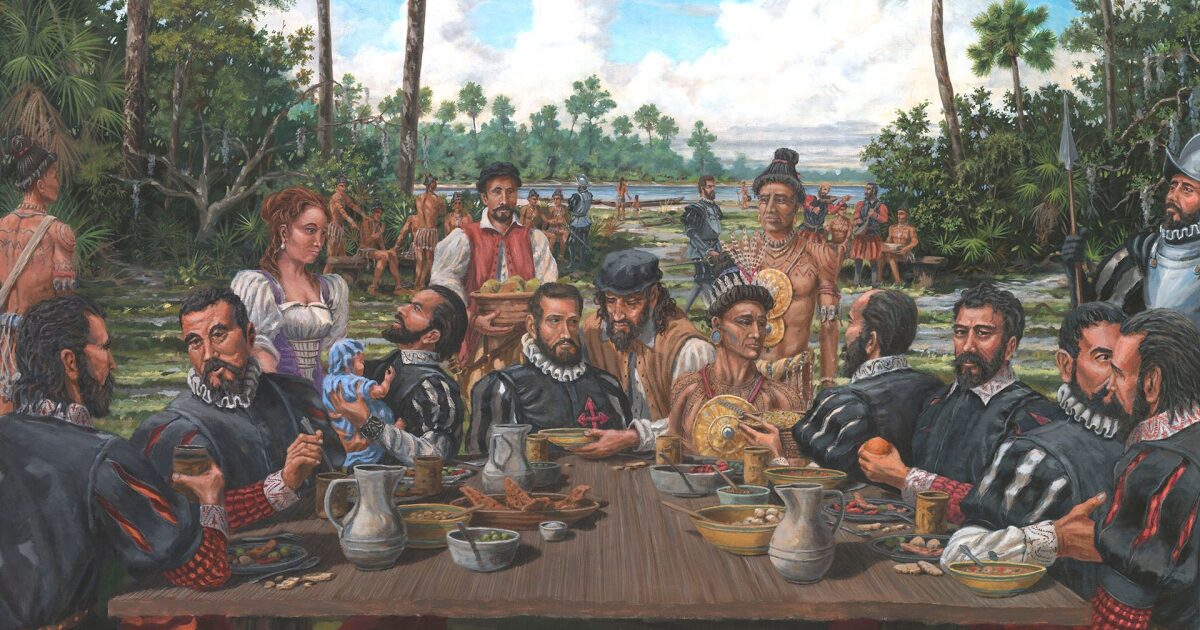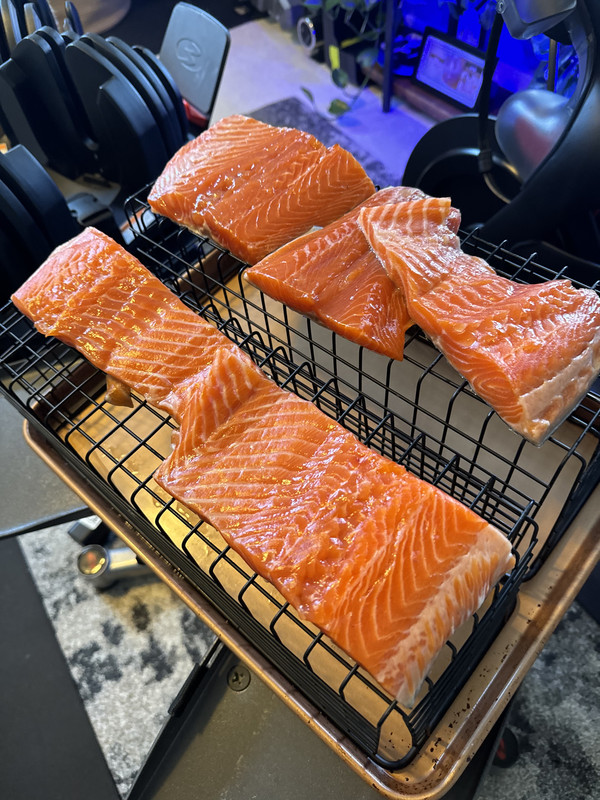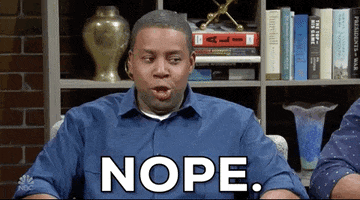It also started a long tradition of the raping of white women by the Seminoles. Shortly followed by the tomahawk chant. A Thanksgiving miracle!Speaking of Thanksgiving mythology, the first Thanksgiving happened in Florida....
Forget pilgrims, pumpkins and Plymouth. The first Thanksgiving feast took place in Florida, not Massachusetts.
That's according to historian Rodney Kite Powell of the Tampa Bay History Center.
In this 2019 episode from The Zest Podcast, 2019, Powell spoke to Zest host Robin Sussingham about why Florida deserves credit for the first Thanksgiving.
Portions of this interview were edited for length and clarity.
We all learned that the first Thanksgiving took place in Plymouth between the pilgrims and the Indians. So now we hear that actually the first Thanksgiving may have actually taken place in Florida.
How it really makes the most sense to explain the idea of a Thanksgiving, that first Thanksgiving. And so the idea of thanking God for safe travel and arrival. And for the ability to kind of keep on living occurred here in Florida, before it occurred in Plymouth. Actually, several years, 56 years before the 1621 pilgrim Thanksgiving. And that took place in St. Augustine. And it was on Sept. 8, 1565. And it was led by several different Spanish priests. It was all part of the expedition of Pedro Menéndez de Avilés. And there were around 800 crew members who were part of that. and so, a variety of people — not just Spaniards, but people from from all over Europe — who were part of that crew to try and create a settlement in Florida, which was successful.
Who were they having Thanksgiving with? Was the people that were on the ship? The explorers, I guess mainly Spaniards, but you said other people who had other sailors I guess who had come from elsewhere. And then who were the Native Americans? What was the tribe then?
So they actually did invite the native group that was in the St. Augustine area, they're known as the Seloy. And they did take part in the ceremony. And so there's actually a description of it. One of the priests, Father Lopez, recounted later that, as the ceremony was progressing, the native people imitated everything that they saw the Spaniards and the other congregants doing. And so they didn't know what was going on, because they couldn't, of course, speak the language. And they'd never seen a religious practice like that before. But at least it appeared they were showing some form of respect to it by by imitating what they saw.
So why didn't that become our first Thanksgiving? Why do we have the story of the pilgrims instead?
Well, there's no reason why we don't think about a lot of things as being firsts here in Florida, but in fact, they are those firsts. And that's because this was a Spanish celebration. And the Puritans and what we think of as a traditional first Thanksgiving, and the founding of Thanksgiving, was English. And we, the United States, grew out of the 13 English colonies. And so Florida history, Spanish history, even French history, those stories just weren't maintained as the history of our country was being written in the 19th century.
And so that was kind of the aborted history because they weren't from England.
Exactly. So the English history, English stories, won out in general over those those non-English stories. So you still had things like Ponce de Leon and those little facts. But some of the great details, and some of those other great stories like potentially the first Thanksgiving occurring in St. Augustine, those just get shuffled away. Because it doesn't follow the English narrative.
Describe to me, what do you think it looked like? What was the ceremony like? What was that Thanksgiving like?
So the ceremony was religious. It was a Catholic ceremony. There was a feast day on the day that they arrived. And it was the Nativity of the Blessed Virgin Mary. And so it was a Catholic ceremony of Thanksgiving, and they would have had a meal afterward. And they just arrived, they had the food stuffs that were onboard the ships for the journey across the Atlantic Ocean. And so they had hardtack, which is really, really hard crackers basically, kind of a stew that would have been made of garbanzo beans and pork. Not like Spanish bean soup. But it was called cosido. But it was maybe kind of precursor to a soup that we'd be more familiar with. And they would have had red wine. And so wine would have been part of it. And the one thing that isn't known is if the Seloy actually brought food to the occasion. So that's the part of the Thanksgiving story with the Plymouth Colony, of course, is that they were starving and that the native people had to help them. But if, in fact, there was food brought by the native Floridians, it would have included the animals that were here — turkey and deer, and even gopher tortoise — plus lots of fish, because you're on the shore. And so the estuary in St. Augustine would have supplied trout and redfish, all kinds of other things. And then there was corn here, as well as beans and squash and maybe had something that resembles a pumpkin.
So we might have had some of those traditional Thanksgiving foods, but what the Spanish would have brought wouldn't have been the delicious Spanish foods we think of, really. It would have been things that had made a long ocean crossing and maybe weren't so good.
Exactly. So yeah, the offerings that the Spanish really had — and again, probably that would have been the majority of a feast they would have had on this particular feast day — would have been the things that can survive a long ocean journey. So salt pork, and hardtack, and again, wine would have really been the main features of that table.
Yeah, the wine might have been good.
You need that for the hard tack and the salt pork.
So how long did it take? How long did that trip take from Spain?
The thing with the Pedro Menéndez de Avilés expedition is their intent was twofold. They wanted to create a permanent settlement somewhere in Florida, and particularly on Florida's east coast. But they wanted to do so because there was a French settlement near what is now Jacksonville that had been established the year earlier. So they actually came over as quickly as they could because they wanted to try and round out that French settlement. And so I believe it took a month and a half or so to cross the ocean. But almost immediately after this Thanksgiving that they had, they then went to war with the French here in Florida and defeated them, and kicked them out of Florida and really reestablished Florida as a Spanish territory.
How do we know there wasn't a Spanish Thanksgiving before that? When was Hernando De Soto or Ponce de León, when were they here?
So both of those expeditions — and there actually were others — did predate the Pedro Menéndez de Avilés expedition. And so you've got the first credited arrival in Florida of the Spanish in 1513 with Juan Ponce de León, but we do know that there were Spaniards that were here before that. But we don't know who specifically. And then there was a man named Pánfilo de Narváez, who was actually in the Tampa Bay area in 1528, followed by De Soto in 1539. And then even an attempt to settle what is now Pensacola in 1559. So this is the year that we celebrate the 460th anniversary of that attempt. And there may actually have been similar celebrations of Thanksgiving, but they weren't documented. And so the documentation that was found, actually, by a former Florida historian, and he recently passed away, Michael Gannon. He's the one who really found the story of this first Thanksgiving in St. Augustine.
And did he publish it?
He actually did. It was published, I believe, in a newspaper. And this was years and years and years ago, and it was leading up to the days of Thanksgiving like we are now. It made national press and he got calls from all over the country, including from folks up in the Northeast who were furious at him. He even came to be known as "The Grinch Who Stole Thanksgiving." And he kind of reveled in that because I think he enjoyed finding out these new interesting details of Florida history that we just hadn't talked about before.
Well, Rodney Kite Powell, thank you so much. Another interesting story.
Oh, it's my pleasure. Thank you. I love chatting about Florida history.

The first Thanksgiving? That actually took place in Florida
In this interview from The Zest Podcast in 2019, hear from historian Rodney Kite-Powell about the true origins of Thanksgiving (hint: he says it started with the Spaniards and predates the pilgrims).www.wusf.org
Colleges
- AAC
- ACC
- Big 12
- Big East
- Big Ten
- Pac-12
- SEC
- Atlantic 10
- Conference USA
- Independents
- Junior College
- Mountain West
- Sun Belt
- MAC
- More
- Navy
- UAB
- Tulsa
- UTSA
- Charlotte
- Florida Atlantic
- Temple
- Rice
- East Carolina
- USF
- SMU
- North Texas
- Tulane
- Memphis
- Miami
- Louisville
- Virginia
- Syracuse
- Wake Forest
- Duke
- Boston College
- Virginia Tech
- Georgia Tech
- Pittsburgh
- North Carolina
- North Carolina State
- Clemson
- Florida State
- Cincinnati
- BYU
- Houston
- Iowa State
- Kansas State
- Kansas
- Texas
- Oklahoma State
- TCU
- Texas Tech
- Baylor
- Oklahoma
- UCF
- West Virginia
- Wisconsin
- Penn State
- Ohio State
- Purdue
- Minnesota
- Iowa
- Nebraska
- Illinois
- Indiana
- Rutgers
- Michigan State
- Maryland
- Michigan
- Northwestern
- Arizona State
- Oregon State
- UCLA
- Colorado
- Stanford
- Oregon
- Arizona
- California
- Washington
- USC
- Utah
- Washington State
- Texas A&M
- Auburn
- Mississippi State
- Kentucky
- South Carolina
- Arkansas
- Florida
- Missouri
- Ole Miss
- Alabama
- LSU
- Georgia
- Vanderbilt
- Tennessee
- Louisiana Tech
- New Mexico State
- Middle Tennessee
- Western Kentucky
- UTEP
- Florida International University
High School
- West
- Midwest
- Northeast
- Southeast
- Other
- Alaska
- Arizona
- California
- Colorado
- Nevada
- New Mexico
- Northern California
- Oregon
- Southern California Preps
- Washington
- Edgy Tim
- Indiana
- Kansas
- Nebraska
- Iowa
- Michigan
- Minnesota
- Missouri
- Oklahoma Varsity
- Texas Basketball
- Texas
- Wisconsin
- Delaware
- Maryland
- New Jersey Basketball
- New Jersey
- New York City Basketball
- Ohio
- Pennsylvania
- Greater Cincinnati
- Virginia
- West Virginia Preps
ADVERTISEMENT
Install the app
How to install the app on iOS
Follow along with the video below to see how to install our site as a web app on your home screen.
Note: This feature may not be available in some browsers.
You are using an out of date browser. It may not display this or other websites correctly.
You should upgrade or use an alternative browser.
You should upgrade or use an alternative browser.
The Nation: Should America Keep Celebrating Thanksgiving?
- Thread starter FAUlty Gator
- Start date
I like it.Speaking of Thanksgiving mythology, the first Thanksgiving happened in Florida....
Forget pilgrims, pumpkins and Plymouth. The first Thanksgiving feast took place in Florida, not Massachusetts.
That's according to historian Rodney Kite Powell of the Tampa Bay History Center.
In this 2019 episode from The Zest Podcast, 2019, Powell spoke to Zest host Robin Sussingham about why Florida deserves credit for the first Thanksgiving.
Portions of this interview were edited for length and clarity.
We all learned that the first Thanksgiving took place in Plymouth between the pilgrims and the Indians. So now we hear that actually the first Thanksgiving may have actually taken place in Florida.
How it really makes the most sense to explain the idea of a Thanksgiving, that first Thanksgiving. And so the idea of thanking God for safe travel and arrival. And for the ability to kind of keep on living occurred here in Florida, before it occurred in Plymouth. Actually, several years, 56 years before the 1621 pilgrim Thanksgiving. And that took place in St. Augustine. And it was on Sept. 8, 1565. And it was led by several different Spanish priests. It was all part of the expedition of Pedro Menéndez de Avilés. And there were around 800 crew members who were part of that. and so, a variety of people — not just Spaniards, but people from from all over Europe — who were part of that crew to try and create a settlement in Florida, which was successful.
Who were they having Thanksgiving with? Was the people that were on the ship? The explorers, I guess mainly Spaniards, but you said other people who had other sailors I guess who had come from elsewhere. And then who were the Native Americans? What was the tribe then?
So they actually did invite the native group that was in the St. Augustine area, they're known as the Seloy. And they did take part in the ceremony. And so there's actually a description of it. One of the priests, Father Lopez, recounted later that, as the ceremony was progressing, the native people imitated everything that they saw the Spaniards and the other congregants doing. And so they didn't know what was going on, because they couldn't, of course, speak the language. And they'd never seen a religious practice like that before. But at least it appeared they were showing some form of respect to it by by imitating what they saw.
So why didn't that become our first Thanksgiving? Why do we have the story of the pilgrims instead?
Well, there's no reason why we don't think about a lot of things as being firsts here in Florida, but in fact, they are those firsts. And that's because this was a Spanish celebration. And the Puritans and what we think of as a traditional first Thanksgiving, and the founding of Thanksgiving, was English. And we, the United States, grew out of the 13 English colonies. And so Florida history, Spanish history, even French history, those stories just weren't maintained as the history of our country was being written in the 19th century.
And so that was kind of the aborted history because they weren't from England.
Exactly. So the English history, English stories, won out in general over those those non-English stories. So you still had things like Ponce de Leon and those little facts. But some of the great details, and some of those other great stories like potentially the first Thanksgiving occurring in St. Augustine, those just get shuffled away. Because it doesn't follow the English narrative.
Describe to me, what do you think it looked like? What was the ceremony like? What was that Thanksgiving like?
So the ceremony was religious. It was a Catholic ceremony. There was a feast day on the day that they arrived. And it was the Nativity of the Blessed Virgin Mary. And so it was a Catholic ceremony of Thanksgiving, and they would have had a meal afterward. And they just arrived, they had the food stuffs that were onboard the ships for the journey across the Atlantic Ocean. And so they had hardtack, which is really, really hard crackers basically, kind of a stew that would have been made of garbanzo beans and pork. Not like Spanish bean soup. But it was called cosido. But it was maybe kind of precursor to a soup that we'd be more familiar with. And they would have had red wine. And so wine would have been part of it. And the one thing that isn't known is if the Seloy actually brought food to the occasion. So that's the part of the Thanksgiving story with the Plymouth Colony, of course, is that they were starving and that the native people had to help them. But if, in fact, there was food brought by the native Floridians, it would have included the animals that were here — turkey and deer, and even gopher tortoise — plus lots of fish, because you're on the shore. And so the estuary in St. Augustine would have supplied trout and redfish, all kinds of other things. And then there was corn here, as well as beans and squash and maybe had something that resembles a pumpkin.
So we might have had some of those traditional Thanksgiving foods, but what the Spanish would have brought wouldn't have been the delicious Spanish foods we think of, really. It would have been things that had made a long ocean crossing and maybe weren't so good.
Exactly. So yeah, the offerings that the Spanish really had — and again, probably that would have been the majority of a feast they would have had on this particular feast day — would have been the things that can survive a long ocean journey. So salt pork, and hardtack, and again, wine would have really been the main features of that table.
Yeah, the wine might have been good.
You need that for the hard tack and the salt pork.
So how long did it take? How long did that trip take from Spain?
The thing with the Pedro Menéndez de Avilés expedition is their intent was twofold. They wanted to create a permanent settlement somewhere in Florida, and particularly on Florida's east coast. But they wanted to do so because there was a French settlement near what is now Jacksonville that had been established the year earlier. So they actually came over as quickly as they could because they wanted to try and round out that French settlement. And so I believe it took a month and a half or so to cross the ocean. But almost immediately after this Thanksgiving that they had, they then went to war with the French here in Florida and defeated them, and kicked them out of Florida and really reestablished Florida as a Spanish territory.
How do we know there wasn't a Spanish Thanksgiving before that? When was Hernando De Soto or Ponce de León, when were they here?
So both of those expeditions — and there actually were others — did predate the Pedro Menéndez de Avilés expedition. And so you've got the first credited arrival in Florida of the Spanish in 1513 with Juan Ponce de León, but we do know that there were Spaniards that were here before that. But we don't know who specifically. And then there was a man named Pánfilo de Narváez, who was actually in the Tampa Bay area in 1528, followed by De Soto in 1539. And then even an attempt to settle what is now Pensacola in 1559. So this is the year that we celebrate the 460th anniversary of that attempt. And there may actually have been similar celebrations of Thanksgiving, but they weren't documented. And so the documentation that was found, actually, by a former Florida historian, and he recently passed away, Michael Gannon. He's the one who really found the story of this first Thanksgiving in St. Augustine.
And did he publish it?
He actually did. It was published, I believe, in a newspaper. And this was years and years and years ago, and it was leading up to the days of Thanksgiving like we are now. It made national press and he got calls from all over the country, including from folks up in the Northeast who were furious at him. He even came to be known as "The Grinch Who Stole Thanksgiving." And he kind of reveled in that because I think he enjoyed finding out these new interesting details of Florida history that we just hadn't talked about before.
Well, Rodney Kite Powell, thank you so much. Another interesting story.
Oh, it's my pleasure. Thank you. I love chatting about Florida history.

The first Thanksgiving? That actually took place in Florida
In this interview from The Zest Podcast in 2019, hear from historian Rodney Kite-Powell about the true origins of Thanksgiving (hint: he says it started with the Spaniards and predates the pilgrims).www.wusf.org
Pass that fried gator tail please. And that Hearts of Palm salad is delicious. 🙂
- Sep 13, 2002
- 94,066
- 190,287
- 113
I am a couple hours away from putting this beautiful Norwegian Trout into the smoker!Okay. I appreciate your clarification and would probably enjoy your company at my Thanksgiving table.
My pumpkin pie turned out great and now my pecan pie is starting to smell delicious too.
Hope my apple cobbler turns out well too.
Then, slow cook over pecan chips, glazing with maple syrup once an hour.

I do, however, 100% support the actual real world work needed to recover from decades and centuries of colonization and empire building in order to build a more just, equitable and democratic world. What could be more American than that?
#1 We're not a democracy.
#2 "Equity" is slang for socialism.
#3 What's "just" to one party is injustice to another. That's why they have bailiffs in courtrooms.
If you think I’m giving up Guam, you’re out of your goddamned mind!Not at all, which I've said several times.
I love me some Thanksgiving and it is so far removed from the Pilgrim myth - which most people understand is bullshit - that attempting to do so is dumb.
I do, however, 100% support the actual real world work needed to recover from decades and centuries of colonization and empire building in order to build a more just, equitable and democratic world. What could be more American than that?
- Sep 13, 2002
- 94,066
- 190,287
- 113
You got a lot of that shit wrong and/or backwards.#1 We're not a democracy.
#2 "Equity" is slang for socialism.
#3 What's "just" to one party is injustice to another. That's why they have bailiffs in courtrooms.
1. The United States is a not a direct democracy but very much is a representative democracy and a democratic republic.
2. Socialism is a political system that purports to deliver equity but fails as it invariably succumbs to the people in power becoming autocratic. That in no way diminishes the importance and correctness in working toward equity among people.
3. There are very, very black and white injustices that we can see: a sovereign nation invading another (See Russia/Ukraine), terrorism (see Hamas), colonization (see most of Africa for several hundred years). It is good for humans to point out injustice and work toward its reversal whenever they can.
I think the US is moving away from this empire thing you assert we’ve been a part of,
But in the post WWII era some of what you believe was some sort of “vassal” state was extremely important for a world economy that was crushed.
Economic History of that era is vital to know and understand.
But in the post WWII era some of what you believe was some sort of “vassal” state was extremely important for a world economy that was crushed.
Economic History of that era is vital to know and understand.
FIFYIt also started a long tradition of the raping of Gators by the Seminoles. Shortly followed by the Warchant. A Thanksgiving miracle!
Such a stupid idea.
Does anyone really even associate the holiday with the Pilgrims and all that bullshit mythmaking anymore anyway?

It's about arguing with family, eating WAY too much food, falling asleep on the couch (to avoid arguing with family), then waking up when they've all either gone to bed or left and firing up:

Can you name anytime in man's history this hasn't been taking place somewhere in the world? Village on village, country on country, it's always happening and will never stop.3. There are very, very black and white injustices that we can see: a sovereign nation invading another (See Russia/Ukraine), terrorism (see Hamas), colonization (see most of Africa for several hundred years). It is good for humans to point out injustice and work toward its reversal whenever they can.
Ahem….When you say “speak for the turkeys,” do you mean the bird or do you mean honky white boys?I will be the one who speaks for the turkeys, this needs to stop. The senseless killing of innocent turkeys to celebrate a fake day, needs to end. We should only honor Black Friday. Now that's the most important day. The day where we over buy crap we don't need.
This whole idea is stupid. Thanksgiving is about being thankful for family and friends. How it started isn't the point. Halloween wasn't about kids getting candy, that's what it became. Christmas wasn't about presents and decorations, it was about the birth of Yeshua, but it has become about presents and decorations.
Racist much?Ahem….When you say “speak for the turkeys,” do you mean the bird or do you mean honky white boys?
Similar threads
- Replies
- 0
- Views
- 34
- Replies
- 0
- Views
- 93
ADVERTISEMENT
ADVERTISEMENT


